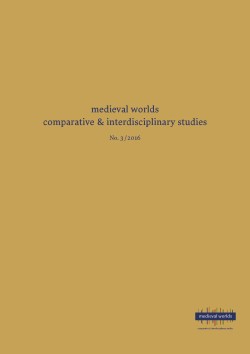|
 |
MEDIEVAL WORLDS provides a new forum for interdisciplinary and transcultural studies of the Middle Ages. Specifically it encourages and links comparative research between different regions and fields and promotes methodological innovation in transdisciplinary studies. Focusing on the Middle Ages (c. 400-1500 CE, but can be extended whenever thematically fruitful or appropriate), MEDIEVAL WORLDS takes a global approach to studying history in a comparative setting.
MEDIEVAL WORLDS is open to regular submissions on comparative topics, but also offers the possibility to propose or advertise subjects that lend themselves to comparison. With a view to connecting people working on related topics in different academic environments, we publish calls for matching articles and for contributions on particular issues.
Table of Contents
Walter POHL, Editor’s Preface
Daniel G. KÖNIG, Charlemagne’s ›Jihād‹ Revisited: Debating the Islamic Contribution to an Epochal Change in the History of Christianization
Tsvetelin STEPANOV, Venerating St. Michael the Archangel in the Holy Roman Empire and in Bulgaria, Tenth–Eleventh Centuries: Similarities, Differences, Transformations
Jesse W. TORGERSON, Could Isidore’s Chronicle Have Delighted Cicero? Using the Concept of Genre to Compare Ancient and Medieval Chronicles
Thomas ERTL - Markus MAYER, Acculturation and Elimination: Europe’s Interaction with the Other (Fourteenth–Sixteenth Century)
Miriam Adan JONES, A Chosen Missionary People? Willibrord, Boniface, and the Election of the Angli
Marieke BRANDT, Heroic History, Disruptive Genealogy: al-Ḥasan al-Hamdānī and the Historical Formation of the Shākir Tribe (Wāʿilah and Dahm) in al-Jawf, Yemen
Daniel MAHONEY, The Political Agency of Kurds as an Ethnic Group in Late Medieval South Arabia
Anna FRAUSCHER - Jelle WASSENAAR - Veronika WIESER, Making Ends Meet. Cross-Cultural Perspectives on the End of Times in Medieval Christianity, Islam, and Buddhism
The journal is funded by the Austrian Science Fund (FWF).

|





 Home
Home Print
Print
 References
References
 Share
Share
